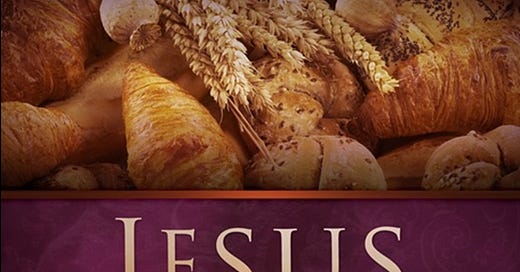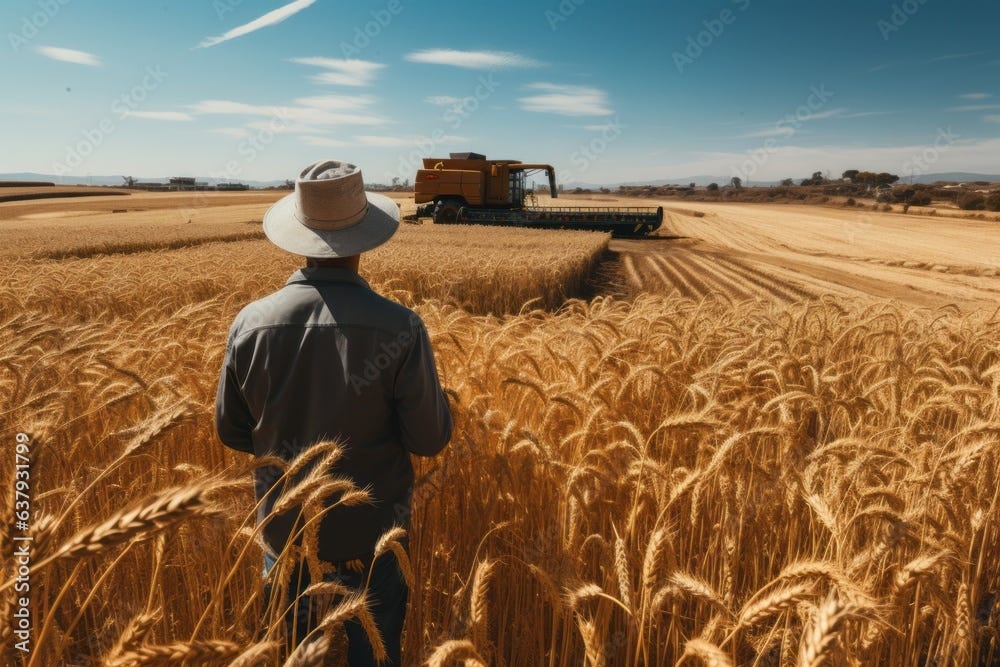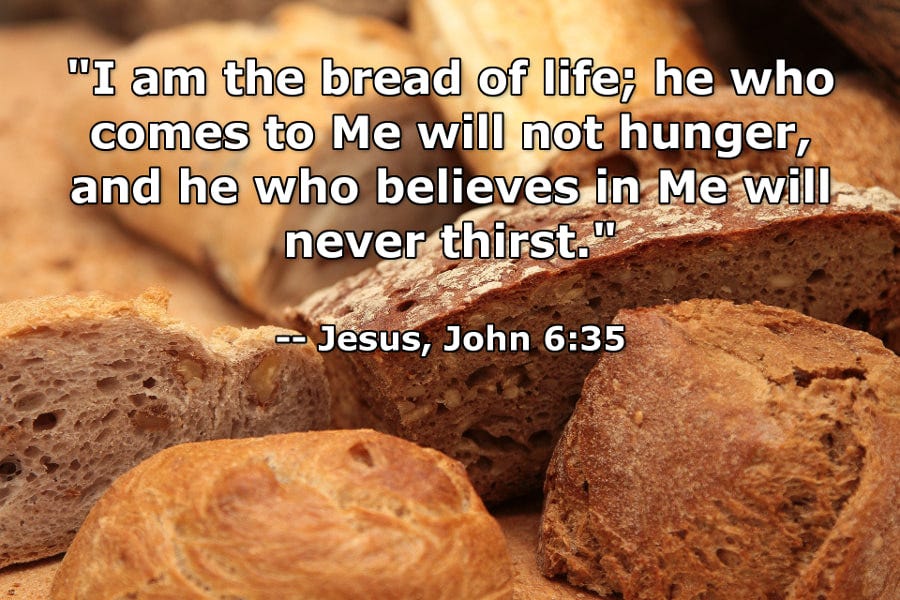Jesus, the Bread of Life
Do not work for the food that perishes, but for the food that endures for eternal life
Context
John 6:27-35
New Revised Standard Version
27 Do not work for the food that perishes but for the food that endures for eternal life, which the Son of Man will give you. For it is on him that God the Father has set his seal.” 28 Then they said to him, “What must we do to perform the works of God?” 29 Jesus answered them, “This is the work of God, that you believe in him whom he has sent.” 30 So they said to him, “What sign are you going to give us, then, so that we may see it and believe you? What work are you performing? 31 Our ancestors ate the manna in the wilderness, as it is written, ‘He gave them bread from heaven to eat.’ ” 32 Then Jesus said to them, “Very truly, I tell you, it was not Moses who gave you the bread from heaven, but it is my Father who gives you the true bread from heaven. 33 For the bread of God is that which[a] comes down from heaven and gives life to the world.” 34 They said to him, “Sir,[b] give us this bread always.”
35 Jesus said to them, “I am the bread of life. Whoever comes to me will never be hungry, and whoever believes in me will never be thirsty.
This substack is a sermon originally preached in a local church congregation. I have amended the content slightly for republication.
Introduction
Well known commentator on the New Testament, William Barclay, describes John’s gospel as “the gospel of the eagle’s eye:”
Because [just as] the eagle of all living creatures alone can look straight into the sun and not be dazzled, so John of all the New Testament writers has the most penetrating gaze into the eternal mysteries and the eternal truths, and into the very mind of God.
Our focus is on one of these “eternal mysteries and eternal truths” in John’s gospel, namely, the grand and evocative portrait of Jesus as the Bread of Life. We look particular at John 6:27-35.
I want to give attention to three main points: firstly, we look at ‘bread’ that can never satisfy the human need and hunger for God; secondly, we take a closer look at Jesus, the living bread who alone gives us God’s life; thirdly, we explore the invitation of Jesus to each one of us, to choose abundant life by choosing to live for him.
1. Bread that can never satisfy the human need and hunger for God
“Bread” and similar words such as “food” and “manna” are used frequently in chapter 6 of John’s gospel. When we take the time to read the entire narrative in John, it does not take us long to realise that “bread” is being used and understood in a variety of different ways. The crowds that throng Jesus, and even those among his own closest disciples seem drawn to and seem constrained by the ordinary, familiar, and material meanings and associations of “bread.” Jesus, on the other hand, uses the physical ordinariness of “bread” as a bridge (metaphor) by which his audience can cross over into the fuller, eternal reality and mystery of God. The consequence of these differences in perspective is a constant misunderstanding between Jesus and his audience, and a failure to grasp the true meaning of who Jesus is and what his mission is all about.
The crowd who follow Jesus, the majority of whom are Jews, were very familiar with the variety of ways in which “bread” is used in the Jewish Scriptures (Old Testament). “Bread” is mentioned about 298 times in the OT and usually symbolises different things. One particular understanding and especially relevant to our examination of John 6, is that of “bread that symbolises the product of human work.”
Bread that symbolises the product of human work
In Genesis 3:19, we read the story of Adam who is driven from the Garden of Eden.God tells Adam that in future he shall eat bread by the sweat of his face until he returns to the ground.
Genesis 3:19
New Revised Standard Version
19 By the sweat of your face
you shall eat bread
until you return to the ground,
for out of it you were taken;
you are dust,
and to dust you shall return.
In this passage, “bread” clearly symbolises the product of human work. Certainly, “the bread of work” includes the basic necessities of human life. But more is meant by “bread” in this verse. In this context, “bread” is a symbol of all the material stuff of life that people strive or work for most of their earthly lives in order to satisfy their need for physical and social well-being and security.
To be sure, work is strongly encouraged in the Bible. Creativity and the dignity of work is full recognised. As human beings we are made in the image of God and God is a worker. The first chapters of the Bible (Genesis) show God as a worker who creates the heavens and the earth and all of life. And God entrusts to human beings the task of stewardship on earth.
Genesis 2:15
New Revised Standard Version
15 The Lord God took the man and put him in the Garden of Eden to till it and keep it.
Work, as God’s best and noblest design for us, is part of God’s invitation to us to be co-creators with him.
And yet, the tragic event of human separation from God in the Garden changes this God-ordained design. The disobedience of Adam and Eve illustrates how humankind throughout history has repeatedly chosen to substitute God’s plans with their own; to take that which rightly belongs to God and to make it their own. The book of Genesis makes it clear that one of the sad consequences of this human choice for self rather than for God is so much of human work is sweat and toil that loses its God designed meaning and purpose.
Genesis 3:17-19
New Revised Standard Version
17 And to the man[a] he said,
“Because you have listened to the voice of your wife
and have eaten of the tree
about which I commanded you,
‘You shall not eat of it,’
cursed is the ground because of you;
in toil you shall eat of it all the days of your life;
18 thorns and thistles it shall bring forth for you;
and you shall eat the plants of the field.
19 By the sweat of your face
you shall eat bread
until you return to the ground,
for out of it you were taken;
you are dust,
and to dust you shall return.”
Against this kind of background, Jesus warns us about the futility of work that is motivated more by physical and material need and ambition, and less by God’s rightful place and purpose in our lives. Jesus would remind us, as he did his earliest audience:
John 6:27
New Revised Standard Version
27 Do not work for the food that perishes but for the food that endures for eternal life, which the Son of Man will give you. For it is on him that God the Father has set his seal.”
We do well to understand that here Jesus is not renouncing either the value or the need for work per se. Jesus’ own earthly life shows that for every year of his public ministry, he spent at least five years working in the carpenter’s shop of his father Joseph in their hometown of Nazareth. Jesus, though, is warning about the mistaken belief that somehow work or human effort can bring us the quality of life and satisfaction that God intends for us. Jesus makes it quite clear that any human obsession with work (“bread”) that satisfies our material well-being and security is doomed ultimately to failure. Such “bread” simply will not last or endure! Yes, there is a physical hunger that material “bread” can satisfy. However, Jesus knows that there is a deeper spiritual hunger that no amount of material wealth or security can ever satisfy.
To illustrate this important lesson, Jesus tells the sobering story of the man for whom a dogged pursuit of the “bread of work” had become an obsession.
Luke 12:16-21
New Revised Standard Version
16 Then he told them a parable: “The land of a rich man produced abundantly. 17 And he thought to himself, ‘What should I do, for I have no place to store my crops?’ 18 Then he said, ‘I will do this: I will pull down my barns and build larger ones, and there I will store all my grain and my goods. 19 And I will say to my soul, Soul, you have ample goods laid up for many years; relax, eat, drink, be merry.’ 20 But God said to him, ‘You fool! This very night your life is being demanded of you. And the things you have prepared, whose will they be?’ 21 So it is with those who store up treasures for themselves but are not rich toward God.”
And then, the startling and unexpected reality of God breaks through his skewed consciousness: “’You fool! This very night your life is being demanded of you. And the things you have prepared, whose will they be?’ So it is with those who store up treasures for themselves but are not rich toward God.”
In telling this story, Jesus teaches us that there is futility and grave danger in prioritising the “bread of human work” above God. He wants us to see that there is an insatiable hunger of the human heart and soul that only God can satisfy. The hunger for truth! The hunger for love! The hunger for abundant life! To name a few.
And so, turning to the crowd, Jesus urges them (as he would us) to heed the instruction: “Do not work for the food that perishes, but for the food that endures to eternal life” (John 6:27).
At this point in the dialogue, the Jews immediately ask Jesus: “What must we do to perform the works of God?” They still seem convinced that somehow a person can earn God’s favour merely by living a moral life and doing good works. But Jesus disabuses them – what he is speaking of is no new “work ethic” that can become a tick-box for anyone in order to merit God’s blessing of eternal life. “Eternal life,” the quality of life that God offers, can never be earned or merited by human effort. This is God’s work and God’s work alone!
Let us turn now to examine more closely what Jesus is really speaking about in our second main point: Jesus, the living Bread who alone can give us God’s life.”
2. Jesus, the living Bread who alone gives us God’s life
Jesus makes a great claim:
John 6:29
New Revised Standard Version
29 Jesus answered them, “This is the work of God, that you believe in him whom he has sent.”
He claims that the true work of God is that the Jews believe in him.
And because there has been so much talk about “bread” and “doing the work of God” in their conversation with Jesus, they instinctively make the first connection to what is familiar to them, the person of Moses and the miracle story of the manna in the wilderness. So they retort: “What sign are you going to give us then, so that we may see it and believe in you? What work are you performing?” (John 6:30)
To paraphrase: “Fine,” they say with baiting tone. “If we are to believe in you, prove your credentials.”
The Jews revered Moses as the greatest leader and prophet in Israel. We find this glowing epitaph of Moses that sums up his influence and impact on the Jewish people throughout history and into the time of Jesus:
Deuteronomy 34:10-12
New Revised Standard Version
10 Never since has there arisen a prophet in Israel like Moses, whom the Lord knew face to face. 11 He was unequaled for all the signs and wonders that the Lord sent him to perform in the land of Egypt, against Pharaoh and all his servants and his entire land, 12 and for all the mighty deeds and all the terrifying displays of power that Moses performed in the sight of all Israel.
And for the Jews, the one event in which God had unmistakably authenticated the authority and power of Moses was in the provision of manna in the wilderness. Therefore, the Jewish audience of Jesus reasoned that he would have to do something equally special to prove his credentials as a prophet of God, greater than Moses.
And Jesus obliges. Though he does so, not through some miraculous act which they seem to crave, but through Words of Wisdom that show the Jews who he really is:
John 6:32-35
New Revised Standard Version
32 Then Jesus said to them, “Very truly, I tell you, it was not Moses who gave you the bread from heaven, but it is my Father who gives you the true bread from heaven. 33 For the bread of God is that which[a] comes down from heaven and gives life to the world.” 34 They said to him, “Sir,[b] give us this bread always.”
35 Jesus said to them, “I am the bread of life. Whoever comes to me will never be hungry, and whoever believes in me will never be thirsty.
Let us explore what Jesus is saying in these words:
Jesus shows the Jews that they are too fixated on the physical “bread of heaven” while he is speaking of “the true bread” from heaven that God his Father gives.
Jesus argues that the true bread of God is not simply “that which” comes down from heaven, but more accurately, “he who” comes down from heaven. Even the manna in the wilderness was not really the true bread of God; it was only a symbol pointing to the true bread of God.
Jesus emphasises that it is “he who comes down from heaven” that can ever give the world the true quality of satisfaction of their hunger, not merely physically and materially, but spiritually. His is the gift of “eternal life.”
And as the crowd leans in, with a quality of eager expectation now, they make this request of Jesus, “Sir, give us this bread always” (v.34).
Flowing from all of his earlier Words of Wisdom, Jesus finally makes this bold and audacious claim:
Once again, if we are to paraphrase what Jesus is saying, it would be something like this: “Look people, look and pause to take it all in. I am the true bread of God. You need no further signs or proofs. God himself, my Father, has set his absolute seal of approval me. Moses was the great prophet and law-giver, this is true. But I myself am the great Life-Giver and the very embodiment of all God’s truth. Through Moses you had your physical hunger satisfied in the wilderness. But I myself am the Living Bread that has come down from heaven. And I alone can truly satisfy the deepest hunger of your soul.”
Before we proceed, we do well to heed a strong word of caution. We must not think that, by placing the primary emphasis on the bread of spiritual life, Jesus is saying that physical life or material needs are unimportant. To draw this conclusion is to make us as guilty of misunderstanding Jesus as the Jews of his day. In fact, God’s provision of manna to satisfy the physical hunger of the Israelites in the wilderness is a powerful reminder of God’s concern for the physical well-being and sustenance of human beings. The physical need for bread, water and light is taken very seriously by God because they constitute the basic requirements for human life. In Matthew’s gospel, we find Jesus’ emphasis of this very truth, in a compelling prophetic word to his earliest audience, and indeed to us in our age:
Matthew 25:31-46
New Revised Standard Version
The Judgment of the Nations
31 “When the Son of Man comes in his glory and all the angels with him, then he will sit on the throne of his glory. 32 All the nations will be gathered before him, and he will separate people one from another as a shepherd separates the sheep from the goats, 33 and he will put the sheep at his right hand and the goats at the left. 34 Then the king will say to those at his right hand, ‘Come, you who are blessed by my Father, inherit the kingdom prepared for you from the foundation of the world, 35 for I was hungry and you gave me food, I was thirsty and you gave me something to drink, I was a stranger and you welcomed me, 36 I was naked and you gave me clothing, I was sick and you took care of me, I was in prison and you visited me.’ 37 Then the righteous will answer him, ‘Lord, when was it that we saw you hungry and gave you food or thirsty and gave you something to drink? 38 And when was it that we saw you a stranger and welcomed you or naked and gave you clothing? 39 And when was it that we saw you sick or in prison and visited you?’ 40 And the king will answer them, ‘Truly I tell you, just as you did it to one of the least of these brothers and sisters of mine, you did it to me.’ 41 Then he will say to those at his left hand, ‘You who are accursed, depart from me into the eternal fire prepared for the devil and his angels, 42 for I was hungry and you gave me no food, I was thirsty and you gave me nothing to drink, 43 I was a stranger and you did not welcome me, naked and you did not give me clothing, sick and in prison and you did not visit me.’ 44 Then they also will answer, ‘Lord, when was it that we saw you hungry or thirsty or a stranger or naked or sick or in prison and did not take care of you?’ 45 Then he will answer them, ‘Truly I tell you, just as you did not do it to one of the least of these, you did not do it to me.’ 46 And these will go away into eternal punishment but the righteous into eternal life.”
Jesus challenges us, as he did his earliest disciples and audience, to see him in “the least” in our society. When we open our hands to feed “the least” in our world, Jesus says to us, “I was hungry and you have me bread.” And when we are tight-fisted and shut our eyes and ears to the cries of “the least” among us, Jesus says to us, “I was hungry and you gave me no food.”
The Lord’s Prayer, which we know so well, is another reminder of this: “Give us this day our daily bread” (Matthew 6:11).
Therefore, we dare not limit God’s work to any narrowly defined “spiritual” programme or belief system of our own making. God is in the business of caring for and restoring life, all of life!
And yet, when Jesus speaks about “eternal life” in the passage in John’s gospel which we are focusing on, he is speaking of a far deeper and richer quality and experience of life than mere physical, moral or religious effort can bring forth and satisfy. According to John 10:10, the message of Jesus is clear:
John 10:10
New Revised Standard Version
10 The thief comes only to steal and kill and destroy. I came that they may have life and have it abundantly.
“Eternal life” that Jesus is talking about is “abundant life” or “life in all its fullness.” This is life lived in a new, intimate, and daily relationship with God; of trust in God, and of loving obedience to God. “Eternal life” is life that no amount of money can buy, or human effort and meritorious endeavour can ever earn. “Eternal life” is that which we search in vain for in any material investments, no matter how hard we believe we try.
In making his stupendous claim, “I am the bread of life,” Jesus is saying that the human search and striving for true meaning, for true purpose, for abundant life, for life in all its fullness need go no further. The search ends with him and in him. And he invites us, as he did the Jewish crowds in 1st century Galilee, to choose abundant life by choosing to live in him and for him.
3. Choose abundant life by choosing to live for Jesus
The New Testament speaks of many different ways in which human beings choose to live for Jesus. In John’s gospel, the most common expression is that we “believe” in him. We find the word “believe” repeated a few time in our passage in John 6:27-35. In verse 29, Jesus says, “This is the work of God, that you believe in him who he has sent.” In verse 35, Jesus extends the invitation: “Whoever comes to me will never be hungry, and whoever believes in me will never be thirsty.”
To “believe” in Jesus is more than giving just mental assent to God or Jesus Christ. In the book of James, we read that “even the demons believe (this much) – and shudder” (2:19). And, as we have already stated earlier, to believe in Jesus is more than “doing good works” or “living a moral life.” Perhaps, we may better understand what it means “to believe” by using the term that the apostle Paul prefers, that of “faith.”
What does faith mean? Let us mention just three emphases which the New Testament offers in answer to this question:
Faith means a definite and special relationship with Jesus Christ. We cannot truly claim to have faith in God if we do not enjoy a real relationship with Jesus. Faith means we are in a relationship with God where God is no longer our enemy, or dreaded judge that we need somehow to appease. God is our loving Parent whom we trust and obey as his daughters and sons.
Faith is the gift of God that he freely gives to each one of us. The writer of the letter to the Ephesians highlights this fundamental truth: “For by grace you have been saved through faith, and this is not your own doing; it is the gift of God - not the result of works, so that no one may boast” (2:8-9).
Faith is a gift of God that we can either choose to accept or reject. As human beings, we have all been given the gift of free choice. This is one quality we have that makes us different from the rest of God’s creation. Way back in the Garden of Eden, we see that Adam and Eve choose to live for self rather than God. Pride and ambition and the craving for material and spiritual prowess outside God’s expressed instructions lead them to turn their backs on God’s true purpose for their lives. The result of this choice is not only physical death, but more tragically, spiritual death or separation from God. And the story of Adam and Eve, we are to understand, is the universal story of how human beings throughout history have chosen to live their lives, in service of self-interest primarily, rather than God-centred, and alas, with dire consequences we are still able to observe and witness to this day.
And so, Jesus invites us to choose him, unreservedly and unconditionally, and in doing so, to choose the gift of abundant life that he offers us (John 6:35).
Conclusion
Later in chapter 6 (verse 66), John records these sombre words, after Jesus has confronted the crowds and his followers about what it really means to believe in him as the Bread of Life:
John 6:66
New Revised Standard Version
66 Because of this many of his disciples turned back and no longer went about with him.
There may have been many reasons for this decision on their part. Perhaps, some of them realised that Jesus was heading for Jerusalem and certain death on the cross. They were “fair weather followers” who desired the best God had to offer them, but at no great cost to themselves (Barclay). For them, the cross meant too much shame and too much pain. Others may have turned back because they refused to let go of the huge investments they had made in the material stuff of life. For them, the drive for physical and social well-being and security mattered more than a commitment to a new and intimate relationship with Jesus and all he stood for.
Seeing this happen, Jesus turns to his closest group of disciples and asks: “Do you also wish to go away?” The inquiry of Jesus lingers and meets each of us in our own times and contexts, especially when the tough realities and challenges of following Jesus are faced. How will we respond?
Will we dare to respond with Simon Peter- with like courage and faith conviction?
John 6:68-69
New Revised Standard Version Updated Edition
68 Simon Peter answered him, “Lord, to whom can we go? You have the words of eternal life. 69 We have come to believe and know that you are the Holy One of God.”
Whether it is our first decisive step of faith towards Jesus, or whether we need to reaffirm our commitment to him – Jesus, the Bread of Life invites us to come and feed on him; to feed on him and have our deepest spiritual hunger satisfied.
Let us say “No!” to the false bread of material safety and security, and the false gods who would claim to offer them.
Let us say “Yes!” to the True Bread of Life that God through Jesus Christ freely offers us.
May God grant each one of us the grace and faith to choose Jesus and to choose abundant life. For his name’s sake. Amen!
Reflection and Journalling Exercise
Reviewing the content of John 6 and this sermon, what is Jesus teaching when he says: “I am the bread of life?” In the context of his own 1st century audience? And for us in our differing contexts today?
What is the meaning of “to believe” in the context of what Jesus teaches, and how does this relate to “faith?”
If you are a committed follower of Jesus, what keeps you committed to following him right now?
If you are not a committed follower of Jesus, but have chosen another way, how do you relate to the message in this sermon?
What questions are you left with that you commit to find answers to?
Thank you for making the time to read and reflect on the content of this sermon (substack).
Kindly consider sharing with anyone who may benefit from the content.
Blessings!











